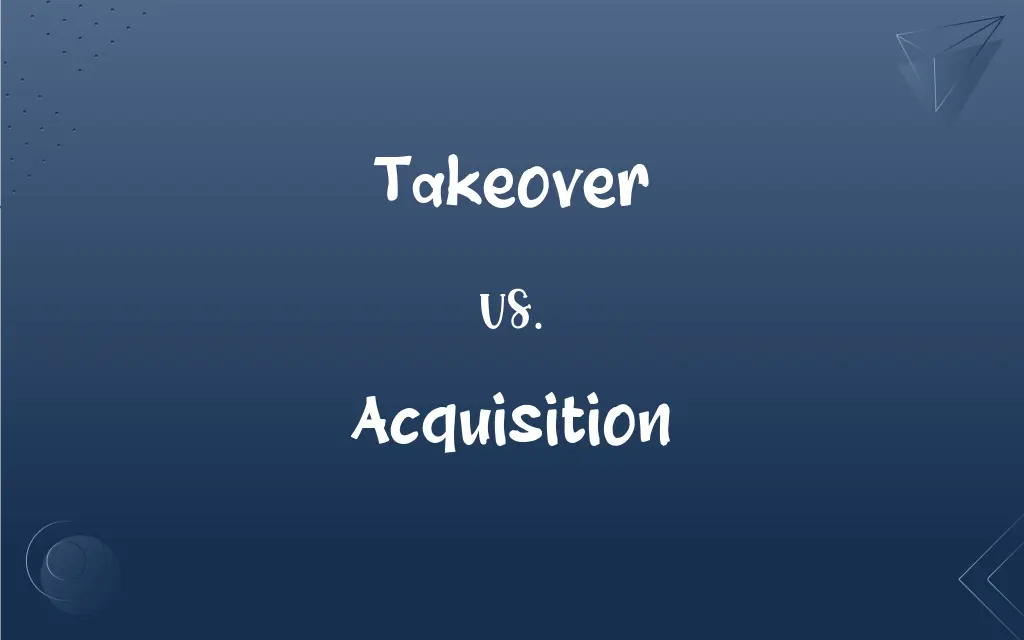Takeover vs. Acquisition: What's the Difference?
Edited by Aimie Carlson || By Harlon Moss || Published on December 30, 2023
A takeover is often a hostile act where a company is bought against its will, while an acquisition is a mutually agreed purchase of a company by another.

Key Differences
A takeover typically implies a more aggressive approach, often without the consent of the target company's management. On the other hand, an acquisition is usually a consensual process where both companies agree to the terms of the purchase.
Takeovers can be seen as hostile and can involve strategies like buying a majority stake against the wishes of the company's current management. In contrast, acquisitions are generally friendly transactions, characterized by negotiations and mutual agreement.
The term 'takeover' often carries a connotation of a power struggle, where the acquiring company imposes its control. Conversely, an acquisition is seen as a business strategy for growth, expansion, or diversification, and is often a more collaborative process.
In a takeover, the process can lead to significant changes in the leadership and structure of the acquired company. In an acquisition, while changes occur, they are typically more strategic and less about asserting control.
Takeovers may sometimes result in a negative public image or employee dissatisfaction due to their hostile nature. Acquisitions, being more amicable, are generally better received by shareholders, employees, and the public.
ADVERTISEMENT
Comparison Chart
Nature
Often hostile, without consent of the target company
Mutually agreed, friendly transaction
Perception
Seen as aggressive, power-driven
Viewed as strategic, collaborative
Impact on Leadership
Can lead to significant leadership changes
Changes are strategic, less about control
Process
Involves strategies like buying a majority stake
Characterized by negotiations and mutual agreement
Reception by Stakeholders
May be negative due to hostility
Generally positive due to amicable nature
ADVERTISEMENT
Takeover and Acquisition Definitions
Takeover
A takeover can lead to major changes in a company's structure and management.
The takeover resulted in the replacement of the executive team.
Acquisition
An acquisition is the purchase of one company by another with mutual consent.
The acquisition of the small firm by the multinational was a strategic move.
Takeover
A takeover involves asserting control over another company, often without consent.
The board discussed strategies to prevent a potential takeover.
Acquisition
An acquisition is a business transaction where a company buys another company.
The acquisition was finalized after months of negotiations.
Takeover
A takeover is the acquisition of a company against the will of its management.
The hostile takeover of the firm was met with resistance by its board.
Acquisition
An acquisition is often part of a growth or expansion strategy for a company.
The company's acquisition expanded its market reach.
Takeover
A takeover is a business action where one company gains control of another.
The tech giant's takeover of the startup was unexpected.
Acquisition
An acquisition is a strategic move, often aiming for synergy between companies.
The acquisition created new opportunities for innovation and growth.
Takeover
A takeover often implies a hostile and forceful acquisition.
The company faced a sudden takeover by a larger competitor.
Acquisition
An acquisition involves negotiating terms that are agreeable to both companies.
The acquisition deal was beneficial to both parties.
Takeover
The act or an instance of assuming control or management of or responsibility for something, especially the seizure of power, as in a nation, political organization, or corporation.
Acquisition
The act of acquiring.
Takeover
The performing of an action or a play in a game again after the first performance has been discounted or is under dispute.
Acquisition
Something acquired or gained
Added two new acquisitions to my library.
Takeover
(economics) The purchase of one company by another; a merger without the formation of a new company, especially where some stakeholders in the purchased company oppose the purchase.
Takeover
The acquisition of a public company whose shares are listed on a stock exchange, in contrast to the acquisition of a private company.
Takeover
A time or event in which control or authority, especially over a facility is passed from one party to the next.
Takeover
Alternative form of take over
Takeover
The acquisition of ownership of one company by another company, usually by purchasing a controlling percentage of its stock or by exchanging stock of the purchasing company for that of the purchased company. It is a hostile takeover if the management of the company being taken over is opposed to the deal. A hostile takeover is sometimes organized by a corporate raider.
Takeover
A sudden and decisive change of government illegally or by force
Takeover
A change by sale or merger in the controlling interest of a corporation
FAQs
What is a takeover?
A takeover is when one company acquires another, often against the latter's will.
What is an acquisition?
An acquisition is the purchase of one company by another, typically with mutual agreement.
What are the reasons for an acquisition?
Acquisitions are often made for growth, expansion, diversification, or acquiring assets.
How does a takeover affect company culture?
A takeover can significantly impact company culture, sometimes leading to resistance or uncertainty among employees.
Can a small company acquire a larger one?
Yes, though less common, a smaller company can acquire a larger one, often termed a reverse takeover.
How do shareholders benefit from an acquisition?
Shareholders can benefit from acquisitions through increased share value, dividends, or a more robust company position.
Can a takeover be friendly?
Takeovers are generally viewed as hostile, though there are rare cases of friendly takeovers.
What is due diligence in an acquisition?
Due diligence in an acquisition involves thoroughly evaluating the target company's business, assets, liabilities, and compliance.
What legal processes are involved in a takeover?
Takeovers involve complex legal processes, including regulatory approvals and compliance with securities laws.
What is a defensive strategy against a takeover?
Defensive strategies against takeovers include poison pills, white knights, or improving company value to deter unwanted acquisition attempts.
How are employees affected by an acquisition?
Employees may face changes in management, policies, or job security post-acquisition.
What drives a company to initiate a takeover?
Companies may initiate a takeover to eliminate competition, gain market share, or acquire valuable assets.
How do market conditions affect acquisitions?
Market conditions, such as economic stability and industry trends, significantly influence the timing and success of acquisitions.
Are acquisitions always beneficial for both companies?
While acquisitions aim to be mutually beneficial, the outcomes can vary depending on numerous factors.
Can takeovers be prevented?
Takeovers can sometimes be prevented with the right strategies, such as shareholder rights plans or seeking alternative partners.
Can a takeover lead to monopoly?
A takeover can lead to monopoly if it significantly reduces competition in the market, which may attract regulatory scrutiny.
Are acquisitions common in certain industries?
Acquisitions are common in rapidly evolving industries like technology, healthcare, and finance.
What is the role of management in an acquisition?
Management plays a crucial role in negotiations, decision-making, and integrating the acquired company.
What financial arrangements are common in acquisitions?
Financial arrangements in acquisitions often involve cash transactions, stock swaps, or a combination of both.
Is employee consent needed in a takeover?
Employee consent is not typically required in a takeover, although employee impact is a significant consideration.
About Author
Written by
Harlon MossHarlon is a seasoned quality moderator and accomplished content writer for Difference Wiki. An alumnus of the prestigious University of California, he earned his degree in Computer Science. Leveraging his academic background, Harlon brings a meticulous and informed perspective to his work, ensuring content accuracy and excellence.
Edited by
Aimie CarlsonAimie Carlson, holding a master's degree in English literature, is a fervent English language enthusiast. She lends her writing talents to Difference Wiki, a prominent website that specializes in comparisons, offering readers insightful analyses that both captivate and inform.






































































